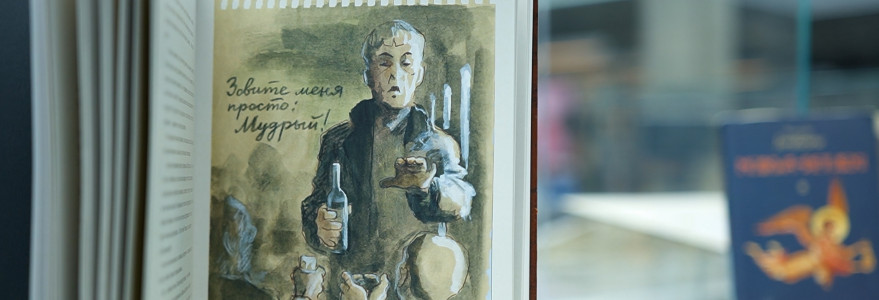The first edition of “Moscow-Petushki” by Venedikt Yerofeyevas was published in a single copy and “spread very quickly”. In the series “Read with UW”, Dr. Seweryn Dmowski from the Faculty of Political Sciences and International Studies at the UW describes a book about the electric train journey, accompanied by heavy intoxication, which presents the realities of life in the Soviet Union.
Dr. Seweryn Dmowski is a specialist in the political history of Poland, the presidential elections in the United States, and the social, cultural, and political aspects of modern football. He visits the University of Warsaw Library regularly. Dr. Dmowski is a fan of prose, which he treats as a change from everyday chores. In the series #CzytajzUW, he presented his favourite book “Moscow-Petushki” that was written between 1969 and 1970.
Olga Laska: Why “Moscow-Petushki”? I thought we were going to talk about sports.
Seweryn Dmowski: “Moscow-Petushki” by Vieniedikt Yerofeyev is a fascinating journey into the depths of not only the “Russian soul” but also into the Soviet Union – to all the absurdities and paradoxes of life in this country. Also, it is a very universal story about a certain inevitability of human fate, which is especially characteristic of Russia of that period. This book is very naturalistic, realistic, and both literal and metaphorical. The main character considers the essence of life, the significance of what matters. This reflection is presented in the form of slight mumbling and drunken monologues. However, this drunken monologue does not dominate the book. In vino veritas. Perhaps, it is the abuse of alcohol by the protagonist that reveals a shameful truth about him and the world in which he lives.
How many times have you got on this train?
It is difficult for me to count the number of times I travelled with Veniedikt Yerofeyev from Moscow to Petushki. This story accompanied me when I entered my adulthood and continues to accompany me today. Every time I reach for it, it seems to me that I can understand something that I saw as much more simplified or absurd.
Does knowing the biography of Yerofeyev, who was struggling with an alcohol problem himself, help understand the book?
The autobiographical threads, not hidden by the author, certainly create an atmosphere in this book. However, too much relating the author’s fate to the story of the described character may impact the reflection. It is not a story about Vieniedikta Yerofeyev, but of a certain attitude that many people in the Soviet Union took towards the current socio-political system.
Who is this book for?
For everyone. Although the author himself emphasises, in the foreword to the second edition, that it is not a book for young girls. Of course, we must remember that this is a point of view from the 1970s with self-irony. It is a position for mature people.
I have read readers’ opinions. It seems that you can either love this book or quite the contrary. It evokes extreme emotions.
It seems to me that you either appreciate it or you simply do not understand it. For some, it will be a story of a drunken expedition and the accompanying alcohol gibberish of the main character. Others will see a metaphor on this journey.
In your opinion, is this a ridiculously scary or amusing book?
I do not know if this book is funny. I did not take it that way. The proportion of sadness, joy and laughter to reflection mirrors, in my opinion, the proportions of these feelings in the way people who lived in the Soviet Union experienced them.
The humorous elements in this book are the recipes for drinks served by the main character. It is perhaps the most cited, eye-catching part of this book. Reading recipes, which include: cologne, purified, various types of perfumes or methylated spirit, arouses certain merriment. It is much less funny when we realize that such drinks were made and someone was drinking them.
The book has gone through many adaptations, mainly theatrical. Readers also praise the audiobook by Roman Wilhelmi.
“Moscow-Petushki” is an extremely grateful story when it comes to adaptations. I had the pleasure to see Marian Opania’s monodrama on stage. Also, I look for any adaptations of Yerofeyev’s work. I perceive this story completely differently in someone else’s interpretation. Every adaptation requires some shortcuts and selections. I encourage anyone who had read the book and feels unsatisfied or needs the inspiration to imagine the main character and his adventures, to get familiar with all adaptations.
And the audiobook?
Reaching for the audiobook can bring the risk that the author of this book will never speak to us other than with the voice of Roman Wilhelmi. It is an absolute masterpiece when it comes to audiobooks that I know.
Have you been to Petushki?
I think this is the dream of every fan of this book. I have been to Moscow twice but have not had the chance to do this route yet. I would like to travel by train 120 km east from Moscow, even only to find out that there is nothing in Petushki, except for the train station.



